Serendip is an independent site partnering with faculty at multiple colleges and universities around the world. Happy exploring!
From biological evolution to emergence: meaning, culture, and esthetics II
Biological inheritance is not the only mechanism of evolutionary change
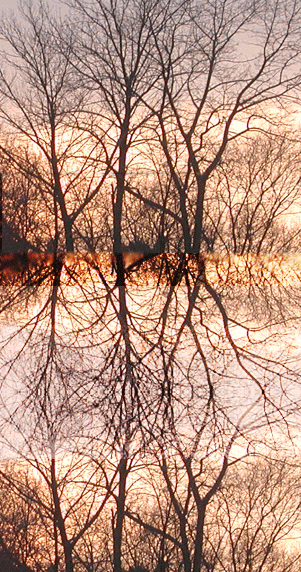
- lateral spread of genetic information
- impacts of individual and social behavior on differential reproductive success
- individual and cultural change itself
How do we think of individual change, of culture and cultural change? Is it all genetic inheritance or is there something different/more involved?
"Psychology will be based on a new foundation, that of the necessary acquirement of each mental power and capacity by gradation. Light will be shown on the origin of man and his history." ... Darwin, Origin of Species
"[Evolution] is a dangerous idea. My admiration for Darwin's magnificent idea is unbounded but I, too, cherish many of the ideas and ideals that it seems to challenge, and want to protect them ... I want to protect the campfire song, and what is beautiful and true in it ... The only good way to do this is to ... is to cut through smokescreens and and look at the idea as unflinchingly, as dispassionately, as possible" ... Daniel Dennett, Darwin's Dangerous Idea, pp 21-22
"There is no denying, at this point, that Darwin's idea is a univeral solvent, capable of cutting right to the heart of everything in sight. The question is what does it leave behind? I have tired to show that once it passes through everything, we are left with stronger, sounder versions of our most important ideas. Some of the traditional details perish, and some of these losses are to be regretted, but good riddance to the rest of them. What remains is more than enough to build on." .... Daniel Dennett, Darwin's Dangerous Idea, pp 521
Is Dennett successful? Is it an adequate extension of a non-foundational narrative story? Are we happy with it? If not, why?
Dennett Overview:
| Wonderfully Useful | Iffy | Problems? |
|
universal acid
greedy vs proper reductionism cranes vs skyhooks nice tries emergent meaning/intentionality cultural transmission |
"selfish" genes
selfish memes algorithms forced moves libraries, search landscape (akin to niches) |
genes and memes and selection and NOTHING else? individuals/cultures are cranes, no skyhooks no space beyond the "libraries"?
|
Daniel Dennett, empiricist?, foundationalist or non-foundationalist?, fiction or non-fiction?
| Bright/Educated (and sometimes out of control) |
Committed to (a particular kind of) Rigor in Thought | Some Times Too Much So? (and hence oddly timid? as well as limited?) |
| "To put it bluntly but fairly, anyone who today who doubts that the variety of life on this planet was produced by a process of evolution is simply ignorant, excusably ignorant in a world where three out of four people have learned to read and write" (p 46) | "It makes sense to err on the side of greedy reductionism, to try for the simple model before wallowing around in complexities" (p 396) | "If a ... brain were truly capable of non-algorithmic activity, and if we have such brains, and if our brains are themselves the products of an algorithmic process ... an algorithmic process (natural selection in its various levels and incarnations) creates a non-algorithmic subprocess of subroutine, turning the whole process (evolution up to and including ... brains) into a non-algorithmic process after all. This would be a cascade of cranes creating, eventually, a real skyhook! ... The position is, I guess, possible, but ... (p 448) |
The Problem/Solution for Dennett, for us?:
- "In the beginning was the Word ..." ("logos" -> intent, reason, cause)
- Possibility that it is not so (non-foundationalism), that intent/reason/meaning/esthetics were not present at the beginning, leading to ...
- "fears that the wrong answer [to whether evolution is the
explanation] would have intolerable moral [and other] implications [no
comfort/goodness/personal responsibility]" (Dennett, p 20], ie that
things important to us would prove to be shams/illusions
- Dennett's solution ...
Selfish genes, selfish memes, exploration within a fixed landscape/library, emergent meaning/intentionality/morality within that constraint, a semi-inevitable outcome in which individuals, societies, cultures exist but have no causal significance
"Darwin has shown us how, in fact, EVERYTHING is just such a product [of mindless purposeless forces] ... Darwin offers us [a convincing explanation of how God is distributed in the whole of nature]: it is in the distribution of Design through out nature, creating, in the Tree of Life, an utterly unique and irreplaceable creation ... that wonderful wedding of chance and necessity ... [that] just happened to happen, in the fulness of time ... it did make the ivy twine and the sky so blue, so perhaps the song I love tells a truth after all ... it is surely a being that is greater than anything any of us will ever conceive of in detail worthy of its detail ... I can stand in affirmation of its significance." (p 520)
- Paul's problem (maybe yours?) ...
Admiration and awe is all very fine, but I want to be an agent, to MATTER, not only to be shaped by but to shape, to be more than a product of genes and memes.
science itself will teach man... that he himself is something of the nature of a piano-key or the stop of an organ... so that everything he does is not done by his willing it, but is done of itself, by the laws of nature....even if this were proved to him by natural science and mathematics, even then he would not become reasonable, but would purposely do something perverse out of simple ingratitude, simply to gain his point.... the whole work of man really seems to consist in nothing but proving to himself every minute that he is a man and not a piano-key! .... Fyodor Dotoevsky, Notes From Underground, 1864
Can we do better about individuals? about cultures? A different story ...
Step 1. The relation between evolution as a non-foundational narrative story and science
| Linear science | Seriously loopy, story teling science |
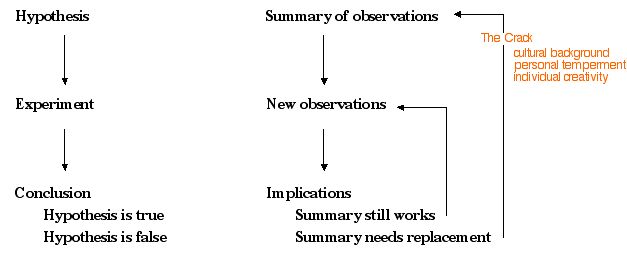
|
|
| Science as successive approximations to Truth
Non-narrative? |
Science as ongoing story telling and story revision: repeated making of observations, interpreting and summarizing observations, making new observations, making new summaries ... individually and collectively Science as skepticism, a style of inquiry that can be used for anything, one which everybody is equipped to to/can get better at/be further empowered by, and contribute to - a way of making sense of what is but even more of exploring what might yet be Narrative? (see The Nature of Science) |
Where in biological inheritance is the "crack"? "personal temperment," "individual creativity," "cultural background"? Are these simply direct consequences of biological inheritance, some of the "traditional details" that need to "perish," "losses to be regretted," or something more? And, if something more, do we need to look elsewhere for them or can they be accounted for within a non-foundational story that Darwin helped initiate?
Looking elsewhere for selves and cultures ...
Finding selves and cultures (plus) within evolution = emergence
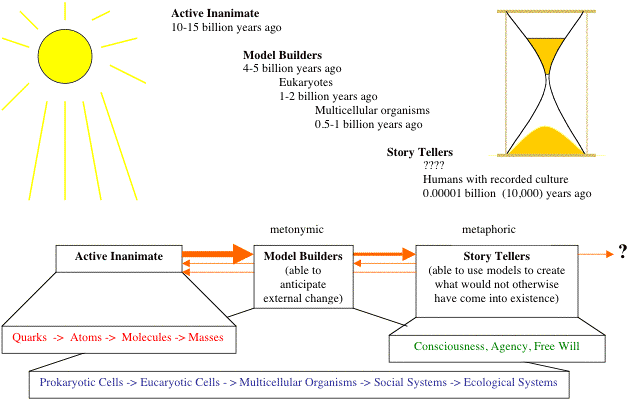
Individuals and cultures (including meaning, intention, esthetics) don't disappear, don't exist in some different parallel world, were not present at the beginning ...
They are instead themselves outcomes of an evolutionary process based in randomness and,
once having come into being,
they in turn become causal influences in that process, using randomness
Humans share with all other living organisms the wherewithal to explore forms of life,
and can do so as well though story telling
The story telling brain as a new development in evolution (a new form that in turn ...)
 |
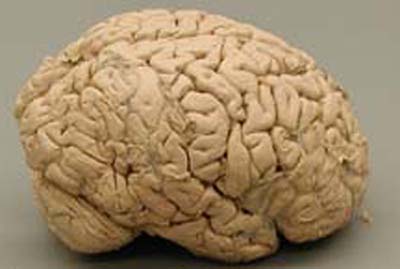 |
 |
Neocortex gives us the capacity to tell stories, to go beyond experiences, to conceive/explore/bring into existence new worlds, to create meaning using randomness and out of randomness
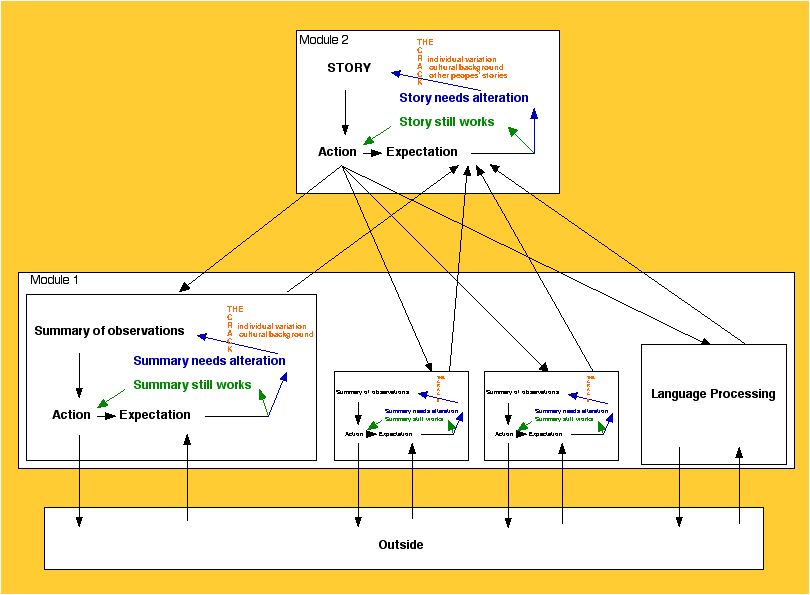
An unconscious AND a conscious "crack"
Both self and culture can influence story which in turn can influence unconscious
Conscious crack an accelerator of evolutionary exploration
Creates not only form but meaning and esthetics, personality responsibility, free will




Comments
Post new comment